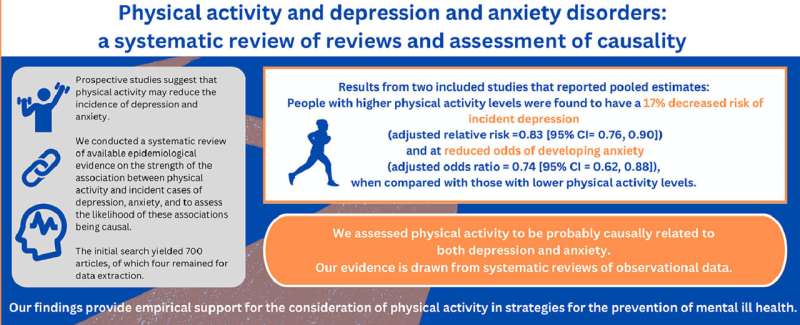This article has been reviewed according to Science X's editorial process and policies. Editors have highlighted the following attributes while ensuring the content's credibility:
fact-checked
trusted source
proofread
Physical activity could prevent depression and anxiety and reduce burden on healthcare

Engaging in physical activity for up to 150 minutes a week could prevent 185,000 new cases of anxiety and 1.1 million episodes of depression.
These are the latest findings from Griffith University researchers, who found a causal link between physical activity and depression and anxiety, providing empirical support for the consideration of physical activity in strategies for prevention of mental ill health.
The systematic literature review concluded a lack of physical activity likely causes depression and anxiety, and that adherence to physical activity guidelines could improve the mental health of individuals and reduce the burden to the national healthcare system.
Professor Lennert Veerman said the burden of depression and anxiety is large and growing and has a significant impact on the global population, causing economic strain on individuals and health systems.
"Our findings are novel, because mental health is currently not considered in studies estimating the burden of physical inactivity, suggesting the true burden of physical inactivity is much greater than previously estimated," Professor Veerman said.
"Previous studies have shown physical activity can relieve symptoms of anxiety and depression. Our study shows that it can also prevent new cases."
"We found that if all Australians met the physical activity guidelines, in 25 years, we could prevent about 185,000 new cases of anxiety and 1.1 million episodes of depression, reducing the burden of anxiety and depression by up to 6.4 percent and 4.4 percent, respectively."
Co-author Griffith Research Fellow Dr. Mary Wanjau specializes in epidemiological modeling with a focus on health and economic impact assessment of preventive health strategies.
"Over the lifetime of the Australian population, health care cost savings could reach $10 billion, easing the burden on the health system," Dr. Wanjau said.
"These findings emphasize the need for policies that facilitate and advocate for more physical activity, such as the creation of green and blue spaces, walkable neighborhoods, safe roads for pedestrians and cyclists."
While current recommendations are to engage in regular physical activity for up to 150 minutes per week, any level of physical activity (including low levels) can help prevent future depression and anxiety.
The study is published in the journal AJPM Focus.
More information: Mary Njeri Wanjau et al, Physical Activity and Depression and Anxiety Disorders: A Systematic Review of Reviews and Assessment of Causality, AJPM Focus (2023). DOI: 10.1016/j.focus.2023.100074




















